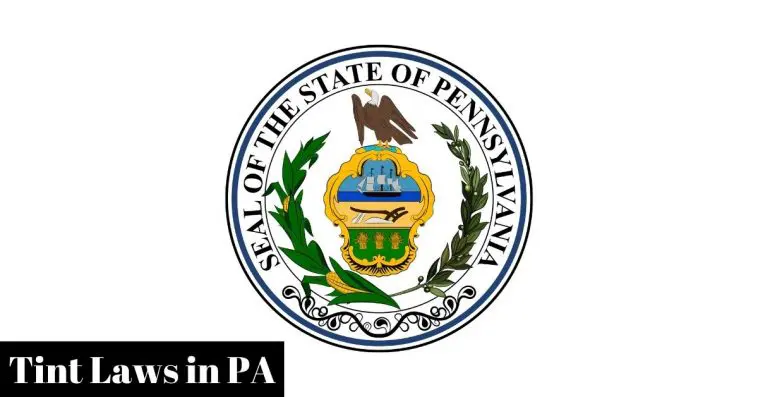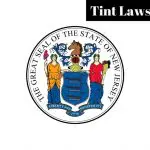Pennsylvanians love owning a tinted window car for three reasons: to enhance comfort, boost the vehicle appearance, and promote utmost protection against sun damage.
Not until Pennsylvania window tint laws went into effect in the year 1999. It holds the 33rd spot (out of 50) for a state to endorse the law.
Sure, you can still give your car a customized and slick look, but with restrictions. To ensure a lawful and safe trip on the highways, I compiled all the information you might need.
It is best to get acquainted with the laws related to window tints to avoid hefty fines and make your ride always a bliss.
TABLE OF CONTENTS
Are You Allowed To Have Tinted Windshield And Windows In Pennsylvania?
Visible Light Transmission (VLT) is the term used for determining the volume of light that can go through your car window.
And the tint film you’re going to use plays an essential role in this. Each state holds different legal acceptable parameters, including Pennsylvania.
The VLT percentage within the region is very explicit and varies for multipurpose and passenger vehicles. So long as you meet the window tint requirements, you should not face any issues at all.
Window tinting is done all through the vehicle’s engineering process. But in some cases, it is carried out after the car has been factory-made and sold.
What Is The Darkest Tint You Can Legally Get In PA?
Pennsylvania is known as one of the strictest among the strictest when it comes to window tints. Unlike some other countries, there is only one visible light transmission percentage that all vehicles should follow. That is 70 percent VLT.
Unless you want to apply for a medical exemption, there are precise requirements the state entails before permitting you to go lower than the proposed tint darkness.
Some might get dismayed, but it is perhaps one of the critical reasons why the state has a lower case of road crashes and deaths than the US.
Is 20% Tint Illegal In PA?
As have stated above, the acceptable tint percentage is 70 percent only, so yes, a 20% tint is deemed illegal. The new Pennsylvania law includes auto inspections for tinted windows. Cars with too dark windows will fail the inspection and hold accountable.
A 20% is already considered enormously dim. It may provide you with a vague sight of the night view, which can cause road accidents. Sticking with the preferred visible light transmission percentage is not only good for your safety.
You are also making the job of law enforcement officers equitably easy. They can quickly spot the dwellers of a car, particularly during a traffic stop.
Can You Get Pulled Over For Tinted Windows In Pennsylvania?
Yes, police officers are given the proper authority to signal you to stop and pull you over if they notice your car windows are tinted too dark.
They are equipped with a Pennsylvania-approved tool to calculate tint darkness. If the percentage hits below 70, you could be charged with a quite negligible sum.
How Much Is A Tint Ticket In PA?
The first violation is often minor and should not worry you a lot. You can even decrease the ticket amount if you opt to settle the problem immediately after pulling over the incident.
The state has not given a fixed minimum charge, but you might expect to pay as low as $20 or as much as $200.
The latter will be mandated if you did not remove the tint since the possibility of getting pulled over once more is relatively high.
But according to most reports, motorists found in Pennsylvania window tint violation were delegated to pay up to $110 fines for the first illegal tint ticket.
You might face graver traffic citations, or worse, criminal charges. That’s why you need to obey the tinting law and take the necessary steps once ticketed.
Window Tint Darkness In Pennsylvania
Passenger vehicles comprise a hardtop, hatchback, sedan, convertible, coupe, & station wagon.
For multipurpose, it could be minibusses, vans, pickups, SUVs, or recreational vehicles.
For Passenger Vehicle
- Windshield – Over 70% VLT along the top three inches of the windshield
- Front Side Windows – At least 70% of light
- Back Side Windows – At least 70% of light
- Rear Window – At least 70% of light
For MPV (Multipurpose Vehicle)
- Windshield – Over 70% along the top three inches of the windshield
- Front Side Windows – At least 70% of light
- Back Side Windows – Any tint darkness
- Rear Window – Any tint darkness
Window Tint Reflection In Pennsylvania
Pennsylvania also sets stringent criteria for how reflective the vehicle should be. Police officers only anticipate seeing an attached registration permit, nothing else.
For Passenger Vehicle
- Front Side Window – No metallic, mirrored, or any non-transparent materials
- Back Side Window – No metallic, mirrored, or any non-transparent materials
For MVP (Multipurpose Vehicle)
- Front Side Window – No metallic, mirrored, or any non-transparent materials
- Back Side Window – No metallic, mirrored, or any non-transparent materials
How Do You Get A Medical Exemption For Window Tint In Pennsylvania?
If you have eyesight or a related health condition that restricts you from getting light exposure, a darker window tint might be allowed by the state.
Melanoma, lupus, photosensitivity, and sunshine allergy are some examples of medical issues that meet the exemption requirements.
Pennsylvania recommends using colorless materials, though they are still capable of filtering UV rays.
You should contact the Department of Transportation’s Medical Unit. Documentation will be provided, which you will need to present to the law enforcement.
Conclusion
Window tint is undeniably a cost-efficient companion that provides you with maximum comfort and safety while traveling. Your car would greatly benefit too – helping it to achieve a glossy look. It can obstruct up to 95 percent of light from going into.
In general, Pennsylvania window tint laws specify that MPV and passenger vehicles should allow more than 70% VLT, alongside zero percent tint reflection. Those with light photosensitivity can request a medical exemption.
Charges will be bestowed if you failed to follow the tinting laws. You should seek professional assistance anytime you are cited or indicted.




